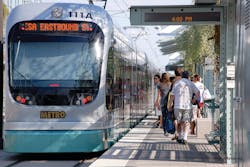The first full day of the South West Transit Association has come to an end and there was a wide variety of sessions to learn from.
The Honorable Nelson Wolff, Bexar County Judge, began the day welcoming attendees. He gave a little insight to the area with the explosion of growth in several areas of San Antonio. He stressed that whether people want to live in the suburbs or in the city core, there needs to be choices for people and that it doesn't work unless you have a solid public transit system. "Those that live in a city with a streetcar or rail know what I'm talking about," he said.
San Antonio is the only city of significant size that doesn't have rail and that is where the controversy lies, he said. "When you build a streetcar system, it's not for the faint of heart."
Going Mobile
A new form of payment recently took over the Dallas-Fort Worth area and Dallas Area Rapid Transit Executive Vice President/CFO David Leininger shared their story.
The mobile payment app, GoPass was a one-stop mobile solution for a regional ticketing system for DART, the Denton County Transportation Authority and the Fort Worth Transportation Authority. Just looking at DART's available media, Leininger showed a slide that had more than 60 different pieces of media that were in use.
In the approximately five months it's been available, there have been more than 90,000 downloads: averaging 600-650 downloads per day.
"Making something simple was not simple," Leininger stressed. DART had a group of 700 Beta testers. The best thing, he said, was that they created a Facebook page for these testers. The testers talked to each other and when one had a question, another tester would answer it.
One of the most important things was to have buy-in of the bus operators, fare officers and customer service reps. "If you don't," he said, "it won't work."
The operators saw it and the benefits to it. It was easy to use -- for riders and operators. And, he said the operators liked the "cool factor" of having a mobile app. Now DART has those additional "sales people" out there -- the bus operators.
DART even got positive editorial from local paper, said Leininger. He said mobile ticketing is not a solution for everything, but it is a solution for a lot of things. And, it saves money. It costs 14/15 percent to collect cash and with the mobile ticketing app, that is down to 7 or 8 percent.
To read more on mobile ticketing and DART's GoPass, visit www.MassTransitmag.com/11201209
Rural BRT
VelociRFTA is the first rural bus rapid transit system in the U.S. The Roaring Fork River Valley is home to 33,000 residents and Roaring Fork Transportation Authority provides service from Aspen to Rifle, a 70-mile distance. The bus service was about a two hour commute. Until September 2013 with the introduction of its BRT service, which has knocked that commute down to an hour.
In 2008, a sales tax referendum was passed in all eight jurisdictions. The dedicated funding source for capital and operating expenses allowed RFTA to go to the FTA to get a Small Starts grant for just over $46 million.
The BRT service features rail-like features, limited to eight stops, frequent service, level boarding, multiple doors, signal priority and exclusive bus lanes at segments.
Light Rail is a Game Changer
Valley Metro CEO Steve Banta spoke of building the "Total Transit Network." He explained that meant many modes, working together. Providing more than 73 million trips a year, he said, "Phoenix is not seen as a transit mecca but dog gone it, we're working toward it."
The 28-mile light rail system connects Tempe, Mesa and Phoenix, and it also connects to the airport via SkyTrain. Due to rail, he explained how development has been a very good story in this area.
For more information on Valley Metro and development in the area due to rail, visit www.MassTransitmag.com/10951203.
A Wild Ride
Andrew Evans, contributing editor for National Geographic, gave a presentation, Ten Weeks, 14 Countries and 12,000 miles - to Antarctica - On a Bus, which garnered a standing ovation from the crowd.
The presentation began with him telling stories of some of his previous travels and relating those to public transportation.
My favorite was his story of visiting New Orleans and being invited to a New Orleans' vampire ball. Spending enough time with some "really creepy people"
to get to know them gave him a different perspective, he explained. He learned the host of the ball was a phlebotomist by day. Sitting next to someone you wouldn't normally in a million years, meeting some characters, this is public transportation he said.
The second part of his presentation was about his trek from Washington, D.C. to Antarctica. Visiting Antarctica was a long-held dream and he eventually made that trek, by bus. He traveled by bus to the Southern-most tip of South America and then rode the National Geographic boat the last 2,000 miles.
Evans shared his struggles, dangers and adventure through each country and along every bus route. One part of his story that I later heard different people talking about was his Greyhound ride. At a station in Georgia he said the bus driver came on to ask if that white guy was back on the bus. "You can't understand what public transportation is like until you're the minority," he said.
He said when he got to Montgomery, Alabama, he remembered that riding the bus without discrimination is a civil right that we have fought long and hard for.
He ended his presentation showing photos and video from a sea turtle rehabilitation center he had visited. One green sea turtle, Allison, had lost all but one flipper to a shark. An intern, who was also a surfer, designed a contraption that allowed Allison to swim. He said watching this was a reminder that every life is worth living and now, this turtle had a life. "This is transportation," he said.
"You take people who can't get from A to B on their own. You give them freedom, you give them life.
"It is your gift to the world."




